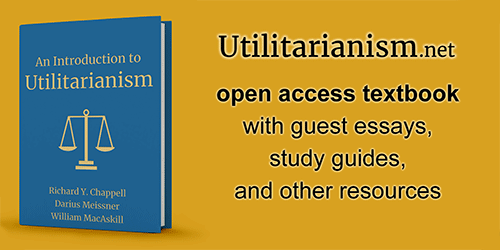Article Spotlight: “The Ordinary Meaningful Life” by Joshua Glasgow
After a bit of a delay, we’re resuming the Article Spotlight series, in which the authors of recent journal articles are invited to write brief posts here about them.
As noted at the time of the first installment, the articles featured will tend to be ones judged to be of interest to a wide range of philosophers. An article’s inclusion in this series should not be construed as an endorsement of its argument or agreement with its conclusions, but rather as a way of saying, “this might be interesting to discuss.”
In this month’s post, Joshua Glasgow, professor of philosophy at Sonoma State University, discusses his recent article, “The Ordinary Meaningful Life,” which appeared earlier this year in The Journal of the American Philosophical Association—the official version should be publicly available; if you can’t access it, there is a link to a preprint here.
[Originally posted on December 8, 2022]
The Ordinary Meaningful Life
by Joshua Glasgow
We celebrate being important. Why? In particular, why should you care about whether you are especially important, or great, or significant?
Some branches of normativity offer easy-ish answers to this question. In particular, we probably have strong moral reason to be important in certain ways. If you can cure Covid-19, then you should, morally speaking. If you can do something that would lift millions out of poverty, then you should, morally speaking. If you can be the hero who finally invents a pillowcase that stays cool all night, then… well, then what are you doing reading this?? Get cracking, please.
But many people also find themselves attracted to being important for non-moral reasons. They want to be the next Sonia Sotomayor, or Barack Obama, or Miles Davis, or Marie Curie—or Socrates—on the thought that being great would make for a better life, not just for morality nor the greater good, but also for them. That is, being extraordinarily important is supposed to be in our own interests.
(The ‘we’ here is rhetorical; the drive to be important may well be culturally mediated and shaped by gender and other social norms.)
Of course, as with moral demands, there are plausibly rational limits on what to give up to be one of the Greats. But that doesn’t change the basic value judgment: to be significant is, other things equal, good for you. It’s a powerful draw, this impulse to be significant. Which returns us to the question: Why think it is in one’s own self-interest to be a Very Important Person?
One vibrant discussion in philosophy has taken up this question: the conversation about how we can find meaning in our lives. Most of the parties to this debate (who otherwise disagree about the nature of meaningfulness) converge on the conclusion that being extraordinarily important would add meaning to one’s life. In a recent article in the Journal of the American Philosophical Association, “The Ordinary Meaningful Life,” I challenge that near-consensus. I argue that we get no extra meaning from being important that is not equally available in the unimportant, ordinary life.
I’m also presently at work to build out a more complete case for being merely ordinary, where I survey other parts of the prudential landscape (achievement, flourishing, etc.) for other potential (non-subjectivist) rationales for seeking importance. Short answer: there aren’t any such rationales, at least not for being important itself. That is, we have no reasons of self-interest to be important that don’t instrumentally reduce to reasons to reap the rewards society contingently attaches to positions and feats of importance.
Here I want to explore some consequences of abandoning the impulse to be significant. If being ordinary is just as good for us as being extraordinary, then how should we (re)orient our thinking?
Maybe the most urgent matter is to stop telling our children that they should try to do something world-changing. When parents have the child’s own interests at heart, the implication of importance’s prudential valuelessness is that the parent should stop encouraging the child to be important. More accurately, importance itself will have little to recommend it, though obviously it can return those lucrative social rewards. So maybe you should encourage your little one to be important if you want them to one day secure fame and fortune. But short of that, parents ought to give it a rest. Rather than tell your child, “You can be President one day!” we might just as well tell them, “You can be an electrician one day!” Or maybe simply, “You can have a good life in so many ways!” If there are plenty of equally valuable endeavors for our children to do, and if those endeavors do not become more prudentially valuable the more important they become, then we need not direct kids to pursue life plans with the worst odds of success.
And it’s not just the odds that are bad. Once parents factor in the external rewards of being important—the wealth, the adulation, the bountiful swag at Oscars parties—then we also must think about the prudential downsides. Fame can crowd out our most valuable relationships. Fawning fans are an inauthentic and capricious foundation for feelings of self-worth. Excessive amounts of money can disfigure one’s priorities. Presidents age rapidly.
We also no longer need to valorize all those significant individuals whose flaws function, we have been realizing in recent years, as a symbolic counterweight to their greatness. Well, we might want to celebrate the Greats because we want to incentivize people to do great things. We all win when someone cures cancer or improves the educational system, and so if stroking egos gets society those benefits, we might as well lean into celebrity culture a bit. But we should not valorize the Greats because they led lives that we should want for ourselves. From this angle, rather than another statue of some dead President, we should instead prioritize a monument that more abstractly represents what we valued about that President.
These are just a couple of ways that we’d shift our gaze away valuing importance if we stopped believing in the myth that being important is in the important person’s self-interest.



“We have no reasons of self-interest to be important that don’t instrumentally reduce to reasons to reap the rewards society contingently attaches to positions and feats of importance.”
Here’s a challenge: Jesus.
Or, more generally: are there no reasons of self-interest to be spiritually important?
Or take Van Gogh – he was artistically important. He didn’t enjoy the contingent social rewards of this importance. But he was important and he had many reasons of self-interest to be important.
What this suggests is that you’re using a very impoverished notion of importance. But no doubt you’ll tell me why I’m wrong.
To end – I’m on your side, I think. In one of those zeitgeisty coincidences, I wrote about exactly this earlier this week here – https://www.thenewphilosophy.com/wanting-to-be-special/ – I’m the Wallace to your Darwin.
Glasgow appears to be using a definition of “importance” that is closer to “fame” or “deference.”
Is the plumber who unclogs your toilet on Christmas Eve important?
She’s important whenever she unclogs my toilet.
Actually, she’s important even when she doesn’t.
I think I have some theses.
1) A plumber is important when she is unclogging my toilet.
2) A plumber is important when she isn’t unclogging my toilet.
3) A plumber is either unplugging my toilet or she isn’t.
4) Therefore, a plumber is always important.
5) Therefore, Adeimantus, you see you’re wrong about justice.
6) Yes, Socrates. I don’t know how I could have been so foolish.
Damn, maybe I gave up this philosophy game too early. This is tight.
Pranay, the notion of importance I’m working with is, roughly, being of rare and high value, relative to a context. The details to motivate this unpacking of (the relevant sense of) importance are in the article. (And James, note that this comes apart from fame.) But under that account, right, I’m claiming that Jesus and van Gogh had no reasons of self-interest to be important. Jarring, I know, but that’s why it’s interesting, I think.
Has anyone ever really thought that being important, in itself, is in one’s self-interest?
Being influential (e.g., having the power or capacity to do good on a significant scale), and/or getting rewards like fame and money — those things might well be in one’s self-interest. But has any parent ever encouraged a child to be President (or whatever) thinking that being President, in itself, will be its own reward? I tend to doubt it.
Louis, check out the quotes in the fourth paragraph of the linked article for a bunch of philosophers who have held that being important–as contrasted with fame or wealth–add meaning to our lives. In my experience plenty of ‘civilians’ value importance, too, apart from its instrumental payoff, but your experience may depart from mine, of course.
Thanks for directing me to that paragraph – I’ll take a look.
This is like the “quiet quitting” of living a meaningful life, and I tend to agree with it. When meaning in one’s life is based on difficult social achievement, it seems more rational to orient oneself on more modest goals that are more likely to be met — or to focus on other dimensions of meaningfulness that are more within an agent’s control. Achieving some profound success need not be the only way to have meaning in one’s life.
Is “importance” here equivalent to being remembered over the long haul of history? If so, then such importance is imparted by the nature of how history itself evolves: Einstein may well have had a sense that he was an historic figure of importance, but I really doubt van Gogh did, and whether they thought about their lives in such ways really had little to do with how posterity played out. Einstein’s work turned out to be of monumental importance apart from what he thought about it–the same is true of van Gogh. The vicissitudes of all that are inconclusive as to whether importance of that stature factor into how we should value our lives, or raise children. But maybe that conclusion is consistent with the OP after all. If so, it is an observation about the real evolution of legacy as inconsequential to promoting importance as a factor in producing it, and that is certainly a thesis I can embrace. There are tremendous factors of luck that need to be recognized as involved in accounting for legacies that are ultimately valued as important, constitutively and otherwise. Perhaps that role of luck might aid in furthering the thesis of the OP.
I’m still trying to pin down what you mean by importance, in contrast with status or fame. Does Aristotle’s view that human flourishing is a life of virtuous activity or, understood somewhat differently, living one’s life to its full potential, count as a life of importance?